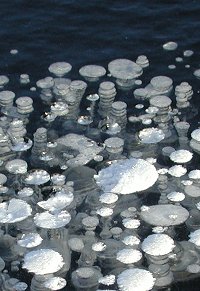 For nearly twenty years anyone concerned about climate change has been worried about the millions and millions of tonnes of frozen methane locked in the permafrost slowly melting and being released into the atmosphere.
For nearly twenty years anyone concerned about climate change has been worried about the millions and millions of tonnes of frozen methane locked in the permafrost slowly melting and being released into the atmosphere.
It was seen as a nightmare scenario, known as a positive feedback mechanism, where the more the Arctic melted the more methane would be released. As methane is 20 times more potent than carbon dioxide, its release into the atmosphere would cause much greater rates of climate change and warming and hence more methane release. So you could get the runaway greenhouse effect….
And as the amount of carbon locked up in methane is believed to be greater than what is locked up in coal, scientists worried it could be the start of a climate catastrophe.
Well now it seems that nightmare is becoming a reality. The Independent reports today how preliminary findings suggest that massive deposits of subsea methane are bubbling to the surface as the Arctic region becomes warmer and its ice retreats
Scientists who have been sailing the entire length of Russia’s northern coast have discovered intense concentrations of methane – sometimes at up to 100 times background levels – over several areas covering thousands of square miles of the Siberian continental shelf.
They have seen areas of sea foaming with gas bubbling up through “methane chimneys” rising from the sea floor. This could mean that the sub-sea layer of permafrost, which has acted like a “lid” to prevent the gas from escaping, has melted away to allow methane to rise from underground deposits.
Orjan Gustafsson of Stockholm University in Sweden, one of the leaders of the expedition, said in an email to the Independent. “Yesterday, for the first time, we documented a field where the release was so intense that the methane did not have time to dissolve into the seawater but was rising as methane bubbles to the sea surface. These ‘methane chimneys’ were documented on echo sounder and with seismic [instruments].”
So what does this all mean? As the Independent’s science editor, Steve Connor says: “The fear is that the amounts released will make global warming far worse than expected.” That could just be an understatement.
